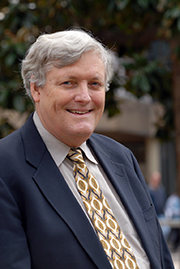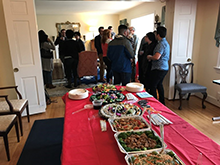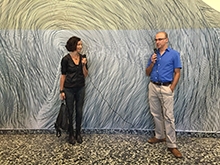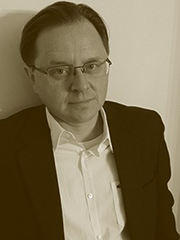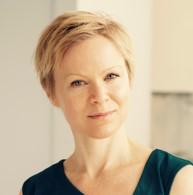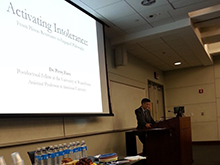Department News, July 2017
Message from the Chair
Department Spotlights
Department Announcements
Alumni Updates/Class Notes
Donor Recognition
Support the Department
Stay Connected
Message from the Chair
Tad Zawidzki
Chair, Department of Philosophy
Our last newsletter (published a year ago) described the challenging transformations we experienced in my first year as chair, especially our move to our new location (Rome Hall). The changes did not let up afterwards. Our administrator of almost three years, Amanda McLaughlin, left at the end of June 2016. We then went through a series of three temporary replacements through January of this year, the last of which, Hyehmi Nolan, was promoted to fulltime in March.
Partly because of this administrative tumult, we missed the publication deadline for our usual December newsletter at the end of 2016. I apologize for the oversight. I think the whole department is very happy with Hyehmi’s decision to take over as academic department administrator, and I’m sure that, in her capable hands, such oversights will become a thing of the past. Skipping last fall’s newsletter means this one is more densely packed with content. At the same time, some typical features, like the spotlight on individual faculty members, are missing.
Another big change this year is the retirement of longtime faculty member Paul Churchill, after 42 years of service to the department; he worked his final day May 31, 2017. Paul has made many invaluable contributions to both the scholarly and pedagogical missions of the department, and will be greatly missed. Details on his career and retirement are included below in the “Spotlight” section.
We continue to receive very welcome material and moral support from our many alumni, for which we are very grateful! Our mission would be impossible without it.
Tad Zawidzki
Chair, Department of Philosophy
Department Spotlights
Paul Churchill
Robert Paul Churchill
Elton Professor Robert Paul Churchill retired May 31, 2017, after 42 years in the GW Philosophy Department. He joined the department in 1975, after completing his PhD at the Johns Hopkins University, defending a dissertation on civil disobedience and teaching for one year at Southern Illinois University. During his time in our department, he made invaluable contributions to our scholarly and educational missions, and generously contributed to the administration of the department and the Columbian College of Arts and Sciences. He served as chair of the Philosophy Department in 1986-88, 1992-93, 1997-2003; director of the Peace Studies Program in 1997-2004; director of the Program in Liberal Arts in 1997-2001; co-founder and co-director of the University Teaching Center in 1990-1992; and taught an inaugural course for the University Honors Program in 1990.
He has published monographs, edited volumes and numerous articles in his major areas of interest: ethics and global justice; ethnic and gender violence, human rights, just war theory, peace studies and nonviolent activism philosophy and national defense, terrorism, tolerance, reconciliation and moral psychology. He is capping off his impressive career with perhaps his most prestigious publication: Women in the Crossfire: Understanding and Ending Honor Killing forthcoming from Oxford University Press.
He has taught many of the courses offered in the department, including Introduction to Philosophy, Introduction to Logic, History of Ancient Philosophy, History of Modern Philosophy, Ethics: Theory and Applications, Philosophy of Law, Social and Political Philosophy and Symbolic Logic. Perhaps most impressively, he has contributed significant innovations to our curriculum, including the undergraduate courses Philosophy of Human Rights and Philosophy and Nonviolence, which are offered every semester and always generate waitlists. The popularity of these courses ensures that we will continue to offer them after Professor Churchill’s retirement. He has also made valuable contributions to our graduate curriculum, including the seminars Normative Issues in Foreign Policy and Human Rights, Philosophy, and Public Policy. Professor Churchill will be missed by colleagues and students alike.
Summer 2016 Study Abroad Trip to Greece
A sunrise near the Theater of Epidaurus
In June 2016, Professor Mark Ralkowski traveled to Greece with nine GW undergraduates and, for the second time in two years, taught History of Ancient Philosophy as a short-term abroad course in Athens and the Peloponnese. The trip was a component of the cross-listed online course in which the students completed work online during Summer Session I, in addition to traveling to Greece. The trip in Greece included visits to many museums, the Acropolis and Parthenon, the Pnyx, the ancient Agora, Kerameikos (the cemetery where Pericles delivered the Funeral Oration), Plato's Academy (where the students had class and played frisbee), Aristotle's Lyceum, the island of Aegina, Delphi, Olympia, Nafplio, the ancient theater of Epidaurus, Mycenae, and the Temple of Poseidon.
Open Letter to the Class of 2017 From Chelsea Murtha, BA '14
Chelsea Murtha
Having spent time on the job market with not one, but two philosophy degrees, I understand that for the Class of 2017 philosophy majors, graduation is potentially both exciting and anxiety inducing. I want to reassure graduates there are plenty of prospects out there for bright philosophy majors, and it's entirely possible to find a job that makes use of your philosophical education. One friend, who focused on philosophy of science, now works for Google's DeepMind. Another, interested in philosophy of economics, is now at Bloomberg. Additionally, many of my ethics-focused friends have ended up in corporate responsibility positions (like I have) or work directly for NGOs. Of course, there are plenty of positions in Washington for those keen on political philosophy. Still, sometimes it's not intuitively obvious to you, or to employers, that a position is perfect for a philosophy major. So, recent grads, if you're stuck, please reach out. I'm happy to have a chat with you about what kinds of positions you should be looking for or about how to successfully talk about philosophy in a cover letter/job interview beyond "I have great analytical reasoning skills." You're not destined to be a barista, but we can get coffee.
Chelsea Murtha is a graduate of the Class of 2014 and was a winner of the Gauss Prize for Excellence in Philosophy that year. After working in international trade consulting for a year, she left for graduate studies at the London School of Economics and Political Science (LSE). At LSE, she focused on paternalism, labor rights, international trade and corporate responsibility. In December 2016, she received an MSc in philosophy and public policy with distinction from LSE. After graduating, she returned to the United States and now works at the U.S. Fashion Industry Association, where she is, among other things, helping launch the association's Social Compliance and Sustainability Committee. She can be reached at chelsea [dot] murtha gmail [dot] com.
gmail [dot] com.
Philosophy Department's 2nd Annual Recruitment Weekend
The department held its second annual recruitment weekend in March, with more than 10 prospective MA students from across the country visiting the department and Washington, D.C. After a private tour of the Department of the Interior and lunch, department members and our guests enjoyed a brown bag talk on ethics and gun safety from Professor David DeGrazia. We capped off the evening with a wonderful reception at the Mount Vernon campus. We look forward to hosting this event again next year and to welcoming our incoming class of 11 MA students this August.
Department Announcements
Hyehmi Nolan after running the Bright Beginnings 5K, April 2017
Hyehmi Nolan joined GW in November of 2016 as the administrator for the Philosophy Department. Prior to joining the Philosophy Department, Hyehmi was an administrative assistant in the Technology Licensing Office at Massachusetts Institute of Technology in Cambridge, Mass. Hyehmi graduated with honors from the University of New Hampshire in 2012, where she obtained a BA in psychology. She is most proud to have served as president of Delta Xi Phi Multicultural Sorority during her senior year of college.
Hyehmi has a wide range of professional experience, from working in her family’s flower shop to coordinating corporate events. She most values working in higher education and plans to pursue a master’s degree in higher education administration.
Hyehmi avidly listens to podcasts, enjoys spending Christmas in Ireland and runs an occasional 5K. She is looking forward to her upcoming summer road trip, where she plans to stargaze in Yellowstone, hike to Angels Landing in Zion National Park and camp in Bryce Canyon.
Dr. Tim Jankowiak, Towson University, speaking at Kant Society Conference
Laura Papish and Joseph Trullinger worked to bring the 14th annual meeting of the Eastern division of the North American Kant Society to GW. Consisting of talks on Kant’s theoretical and practical philosophy, in tandem with two keynote addresses by well-established Susan Meld Shell and David Sussman, the conference stretched over two days (April 29-30) in the Honors Program townhouse on 21st Street. With generous help from multiple departments and Ben Vinson, the dean of the Columbian College of Arts and Sciences, the event ran smoothly and successfully. In particular, Hyehmi deserves special mention for her skillful and tireless assistance in bringing everything together!
Faculty News
Professor Archer with Professor Daniel C. Dennett, after Dennett's talk to the Mind-Brain Institute
Since the last newsletter, Avery Archer has expanded his earlier research focus on the rational significance of intention to include an investigation of the rational significance of agnosticism. His ongoing work on intentions recently yielded a publication, “Do We Need Partial Intentions?” (forthcoming in Philosophia) which is now available electronically and will appear in print later this year.
In it, Archer criticizes Richard Holton’s claim that we must posit the existence of partial intentions in order to explain certain problematic cases and offers an alternative explanation of the cases Holton considers that does not require the positing of partial intentions. His current work on agnosticism has so far yielded two papers, one that argues that there is no practical analogue to agnosticism and a second that explores the relationship between agnosticism and inquiry. Both papers are currently under journal review. He is also working on a third paper on the topic of agnosticism, which critically engages the work of Jane Friedman. These papers have each benefitted from the audience feedback Archer received during a colloquium talk at the University of Vermont (in March 2017), a presentation at the Midwest Epistemology Workshop (in September 2016) and a pair of brown bag discussions with GW philosophy faculty (in November 2016 and April 2017, respectively). This coming June, Archer will be a presenter and course designer for the Philosophy in an Inclusive Key Summer Institute hosted by the Massachusetts Institute of Technology in Cambridge, Mass.
David DeGrazia continues divide his work life between the GW Philosophy Department, where he teaches one course per term, and the NIH Department of Bioethics, where he is mainly involved in scholarship, mentoring and running the Joint Bioethics Colloquium.
This academic year he has had the satisfying opportunity of teaching two new seminars, Moral Status (for graduate students) in the fall, and The Philosophy of Peter Singer (for upper-level philosophy majors) this spring. His MA thesis advisee, Liza Dawson, successfully completed her thesis paper earlier this spring. Meanwhile, his departmental mentee, Laura Papish, received a contract from Oxford University Press for her book on Kant: congrats to our rising young star!
Over the past year, David has given more professional talks than usual, on topics including embryo research, the definition of death, animal research, and gun policy: four in Cape Town, South Africa; one at Harvard University; one at the Eastern APA meeting in Baltimore, and two more at the University of Colorado-Bolder. His major publication has been Debating Gun Control (Oxford University Press), which he wrote with Lester Hunt. He also published his second newspaper op-ed in The Baltimore Sun, arguing that self-defense is a weaker basis for gun rights than is commonly thought (inciting the hostile responses of many gun enthusiasts).
And, as for articles, he published “Nonhuman Primates, Human Need, and Ethical Constraints” (Hastings Center Report); “Relieving Pain Using Dose-Extending Placebos” (Pain, with two co-authors); “Defining the Boundaries of a Right to Adequate Protection: A New Lens on Pediatric Research Ethics” (Journal of Medicine and Philosophy, with two co-authors); an updating of “The Definition of Death” (Stanford Encyclopedia of Philosophy); “Using Pharmaceuticals to Change Personality: Self-Transformation, Identity, and Authenticity,” in Dien Ho (ed.) (Philosophical Issues in Pharmaceuticals); and “Procreative Responsibility in View of What Parents Owe Their Children,” in Leslie Francis (ed.) (The Oxford Handbook of Reproductive Ethics). David looks forward to his sabbatical project, A Theory of Bioethics, which he is authoring with NIH colleague Joe Millum, and appreciates the kind support of a University Facilitating Fund grant.
Professor Friend horseback riding
Michele Friend is continuing to enjoy her sabbatical year. At the beginning of March, she flew to Europe and spent a month as a visiting Professor at the Centre for Logic and Philosophy of Science (Centrum voor Logica en Wetenschapsfilosofi), VUB (Vrije Universiteit Brussel).
She gave a talk at a workshop and then a further talk to a group that joins faculty and graduate students from the University of Gent and the Vreije Universiteit Brussel. At the Vreije Universiteit there is a centre for the study of mathematical practice, including exchanges with mathematicians, psychologists, sociologists, educators, historians and philosophers. Some graduate students get together daily for lunch and exchange views. Michele joined them regularly, and these were very enjoyable and fruitful discussions. After Belgium, Friend went to Lisbon to give two talks at the University of Lisbon.
She will be giving another four talks this summer, each at different conferences on topics as diverse as: robust qualitative assessment of policy in ecological economics; ecologically friendly laboratory practice in chemistry; the pluralist’s conception of foundation in mathematics; and the idea that phenomena can be usefully conceived of as third-order eigenforms in Newtonian mechanics, special relativity and general relativity.
As for publications and writing, the co-edited “Special Issue on Mathematical Pluralism” of the Journal of the Indian Council of Philosophical Research, published by Springer, has finally come out: as JICPR Vol. 34.2. This has been a very nice collaborative effort between Mihir Chakraborty and Friend. It includes an article titled “Varieties of Pluralism and Objectivity in Mathematics.” There are plans afoot to continue collaboration. Friend will most probably return to Kolkata in December 2017.
Friend has two book chapters coming out: “Mathematical Theories as Models” in Humanizing Mathematics and its Philosophy: Essays Celebrating the 90th Birthday or Reuben Hersh. Baharath Sriraman is the editor. It will be published by Birkhäuser. The other book chapter is “Remarks of a Philosopher of Mathematics and Science; Commentary on Louis Kauffman’s ‘Cybernetics, Reflexivity and Second-Order Science,’” in Alexander Riegler, (ed.) New Horizons for Second-Order Cybernetics.
She has a paper coming out in a special issue 32 of Humana.Mente. The special issue is called “Beyond toleration? Inconsistency and pluralism in the empirical sciences.” The paper is called “Inconsistency in Mathematics and Inconsistency in Chemistry.”
María del Rosario Marínez-Ordaz (a PhD student at UNAM) and Friend have co-written and submitted a paper called “Keeping Globally Inconsistent Theories Locally Consistent.” This follows work they did together in Mexico in September and October 2016, and a conference at which they both gave presentations in Campinas, Brazil. Much to Friend’s surprise, presentations of the material in the paper to the groups in Brussels and Lisbon were met with quite a lot of interest. There might be room for further development of the ideas and for more future collaboration.
Until the end of August 2017, Friend will be Europe.
Professor Papish Skeet shooting with students
Laura Papish spent the spring term teaching a proseminar on Kant's theoretical and moral philosophy, and co-hosted, with Joseph Trullinger, this year's Eastern Study Group meeting of the North American Kant Society. Another highlight was hosting a traditional Kant dinner party for her proseminar students, guided by the rules laid out in Kant's Anthropology from a Pragmatic Point of View.
Since the publication of the last newsletter, she has given invited talks at both George Mason University and the University of Chicago and has published "CAPS Psychology and the Empirical Adequacy of Aristotelian Virtue Ethics" in Ethical Theory and Moral Practice. She has also been given a contract by Oxford University Press for her book manuscript, Kant on Evil, Self-Deception, and Moral Reform. She plans to spend the summer trying to ignore the heat in D.C., reading up on virtue epistemology and experimenting with sourdough starters in baking.
Mark Ralkowski was promoted to associate professor at the end of the summer in 2016. He published his edited volume, Louis C.K. and Philosophy, in April 2016, and was pleased to learn in December that it was the bestselling book of the year in Open Court's series on Popular Culture and Philosophy. In June 2016, Ralkowski traveled to Greece with nine GW undergraduates and taught The History of Ancient Philosophy as a short-term abroad course in Athens and the Peloponnese for the second time in two years. Before returning home from Greece, Ralkowski attended a week-long conference on Plato's Phaedrus at a private villa near Poros, Greece. Since returning from Greece, Ralkowski has resumed work on his forthcoming book on the trial of Socrates. He has given talks related to the philosophy of humor, including an invited talk on Louis C.K. to the students and faculty at Loyola University Maryland and a separate paper on humor and compassion, which he presented at Bucknell University's conference on The Ethics and Aesthetics of Stand-Up Comedy. Ralkowski begins his sabbatical during the summer of 2017. During this time, he plans to finish his book and write a short article on the concept of Being-toward-death that will be included in 50 Concepts for an Intersectional Phenomenology, which is being edited by Gail Weiss, Ann Murphy, and Gayle Salamon.
The biggest event in Michael Sigrist’s life this past year was the birth of twin daughters, Livia and Evelyn. In 2016, a book he co-edited, Time and the Philosophy of Action (with co-editor Roman Altshuler) appeared. This project began with a conference here at GW in 2011. He has written a review essay discussing the recent translation of Martin Heidegger's lecture course entitled Interpretation of Nietzsche's Second Untimely Meditation. The review has been accepted for publication by Phenomenological Reviews. In July he presented a paper at Oxford University for the UK Sartre Society that examines widely acknowledged political failures in contemporary liberal democracies with concepts developed by Jean-Paul Sartre, Simone de Beauvoir and Maurice Merleau-Ponty, to understand the failure of post-war Marxism.During 2017, Sigrist hopes to finish work on a book about Heidegger's existentialism. In this book he tries to reclaim Heidegger for the existentialist tradition while simultaneously updating that tradition with recent philosophical work on agency, death and meaning in life.
In the past year Joseph Trullinger has continued to develop his work in the form of conference papers: one given at the Radical Philosophy Association in Lexington in early November, and another at the Idea of God conference at Memorial University of Newfoundland over Thanksgiving. In June of 2016 he took part in the Institute for the History of Philosophy's two-week summer workshop at Emory University, on the subject of Kant's political thought. Participating in this seminar laid the foundations for a new book project he has started to formulate on Kant's philosophy of religion and liberation theology. In addition to his regular teaching, he guided a student's independent study on political theology in the fall of 2016, inspiring a reformulation of his Myth as Truth course in the spring of this year. Last summer he also started a blog (twountruths.com), and taught a course on The Philosophy of Time for prisoners at Jessup Correctional Institution in Maryland
Professor Weiss with some of her 20th Century Continental Philosophy students at the Simone de Beauvoir exhibit at the National Museum of Women in the Arts, April 2017
Gail Weiss has enjoyed her first year as a CCAS dean’s research chair and will hold this position for another two years. She continues to serve as General Secretary for the International Merleau-Ponty Circle (IMPC) and she gave an invited paper titled “Institution, Passivity, and the Shifting Geographies of the Flesh” at the September 2016 IMPC conference held at Brock University in St. Catherine’s, Ontario, Canada.
Gail presented several other papers at international conferences this past year including “The Shame of Shamelessness,” at the Society for Phenomenology and Existentialism (SPEP) conference in Salt Lake City in October 2016, and the American Philosophical Association Pacific Division conference in Seattle in April 2017, and “Doing Time in a For-Profit Space: Re-Negotiated Identities and the Prison-Industrial Complex,” at the Somatechnics conference held in Byron Bay, Australia in December 2016, and at the American Philosophical Association Eastern Division Conference in Baltimore, in January 2017.
She delivered the 58th Annual Hurst Lecture, sponsored by the Department of Philosophy and Religion, American University, on “Shamelessness and Second-Hand Shame,” in April 2017. Also in April 2017, she presented "Trump's Shamelessness and Clinton's Shame: A Philosophical Reckoning with the Results of the 2016 U.S. Presidential Election," at the American Philosophies Forum (APF) sponsored by Emory University in Atlanta.
She is currently finishing her monograph, Existential Ambiguities: Beauvoir and Merleau-Ponty, which is under contract with Indiana University Press and has a new co-edited volume, 50 Concepts for an Intersectional Phenomenology, under contract with Northwestern University Press. She published “The Silverman Network” this fall, in Between Philosophy and Non-Philosophy: Essays in Honor of Hugh J. Silverman (1945–2013), eds. Peter Gratton, Donald A. Landes, and Leonard Lawlor (SUNY Press, 2016, 181-193), and has several articles and book chapters forthcoming.
She also had the pleasure of moderating a panel at the National Museum of Women in the Arts (NMWA) in D.C. in April 2017, on “The Many Faces of Simone de Beauvoir: Author, Philosopher, Feminist,” and she gave one of the keynotes at the 24th Annual International Simone de Beauvoir Society Conference at the University of Haifa, as well as a seminar presentation to the Department of Philosophy at Tel-Aviv University in June 2017.
On the GW front, Gail directed two of our philosophy MA theses this fall and she really loved teaching Philosophy of Race and Gender, Disciplining Bodies, 20th Century Continental Philosophy and Feminist Ethics these last two semesters. All in all, it has been a very busy post-sabbatical year!
Professor Zawidzki with Linn Myers giving an address in front of her installation at the Hirshhorn.
Since the last newsletter, Tadeusz Zawidzki has had a number of papers and book chapters published, including (with Marco Fenici) “Action Understanding in Infancy,” Studia Philosophica Estonica, vol. 9.1 (2016); “The Many Roles of the Intentional Stance,” in Engaging Dennett (2017), Huebner, Ed. (Oxford University Press); and “Mindshaping and Self-Interpretation,” in The Routledge Companion to the Social Mind (2016), Kiverstein, Ed.
In addition, his contribution to the Oxford Handbook of 4e Cognition (Newen, Gallagher, and de Bruin, Eds.), “Mindshaping,” is in press. He also presented “Mindshaping and Mindreading in Social Coordination” at a workshop on game theory in Rome. The workshop was organized by the Center for the Economic Analysis of Risk, and took place September 19-20, 2016. Professor Zawidzki was also invited to a special September 10, 2016, public “Conversation about Impermanence and the Role of the Accidental in Art and Life,” with artist Linn Meyers, at the Hirshhorn art museum (see photograph in this issue of the newsletter). The event was inspired by Meyers’ 2016 exhibit there, “Our View from Here.” In addition, Professor Zawidzki presented his paper, “Suffering and Mindfulness: a Neo-Darwinian Perspective,” to a session of the International Society for Buddhist Philosophy, at the 2017 Meeting of the American Philosophical Association, in Baltimore (January 4, 2017).
Professor Zawidzki continued, this academic year, in his roles as chair of the Philosophy Department, co-director of GWU’s Mind-Brain Institute (with Professor Chet Sherwood of Anthropology) and co-convener of the University Seminar in the Future and History of Mental Well-Being (with Assistant Professor Paul Marvar of Physiology and Pharmacology and advisor for the Mind-Brain Studies minor).
Current Students
Kaylee McNeil (right) with Drs. Clara Fischer (left, University College Dublin) and Dianna Taylor (middle, John Carroll University) at the Society of Women in Philosophy Ireland conference in Galway.
Kaylee McNeil attended the Society of Women in Philosophy Ireland conference in Galway, Ireland, at NUI Galway, which took place from December 2-4. She presented her master's thesis, "The Anti-Vaccination Movement and the Ethics of Care in Parenthood," which she had completed with the aid of her advisor, Dr. Gail Weiss. Kaylee completed her degree this semester and is looking forward to continued involvement in the GW Philosophy Department!
Congratulations to Allie Geoca who was awarded the Thacher-Reynolds Fellowship for the 2017/2018 academic year, under the supervision of Professor Eric Saidel. Funding for the Thacher-Reynolds Memorial Fellowship is provided by the Thacher Endowment, which is the gift of Michael Thacher, BA ’70, an alumnus of the department with a keen interest in seeing it flourish. Inaugurated in 2003-04, the fellowship honors Matthew Reynolds, a former student whose life was tragically cut short while he was pursuing graduate studies.
Congratulations to Ben Goehring for receiving the Gauss Prize for Excellence in Philosophy. The award is offered to an undergraduate who has impressed the faculty with her or his commitment to, and understanding of, the discipline of philosophy.
Sarah E. Holmes defended her master's thesis in May 2017. The work tackles prize-linked savings (PLS), an innovative personal finance tool in which returns to saving are meted out as raffle prizes rather than interest. She uses cognitive science and behavioral economics to address the feasibility of PLS, and philosophy to address its moral acceptability. Earlier this year, Sarah moved to Cambridge, Mass., to begin her dream job working at the National Bureau of Economic Research. Her team studies a wide range of behavioral economics, personal finance, and retirement security issues.
Kevin Liu, third-year philosophy major, presented a paper titled "Should Life Without Parole Be Abolished?: An Analysis of Life Without Parole Sentences in the U.S." at the Social and Political Philosophy Conference at San Diego State University, on April 8th.
Marissa Mangini, a philosophy: public affairs focus major, was accepted to the George Washington School of Medicine and Health Sciences, through a special program for humanities majors. In August, she will be matriculating in and beginning classes.
Natalie Mathes, a rising senior philosophy major, double minoring in psychology and anthropology, will be participating in Harvard's Comparative Cultural Studies Seminar in Greece this summer. The program is an interdisciplinary seminar through Harvard's Center for Hellenic Studies. The five-week program is split between Nafpolio (Greece's first capital), and Thessaloniki (the second largest and wealthiest city of the Byzantine empire), with excursions to archaeological sites and museums in Olympia, Athens and at Mycenae. Natalie is honored to be one of the few non-Harvard students participating in this program, as it's considered one of Harvard's oldest and most competitive programs.
Ethan Terrill was selected to present his paper, "In Defense of a Life-Plus View of Moral Status," at the 39th Annual Graduate Student Conference at the University of Illinois at Urbana-Champaign.
Department Events
A Year of Endowed Lectures
Dr. Firmin DeBrabander
The 2016 Griffith Lecture titled “Radical Gun Rights And The Rule of Law” was presented by Dr. Firmin DeBrabander, professor of philosophy at the Maryland Institute College of Art in Baltimore on October 7th, 2016. DeBrabander focused on social and political philosophy. He has written articles in a variety of scholarly publications, and commentary pieces for The New York Times, Washington Post, Atlantic and Salon.
Dr. Susanna Schellenberg
The 2017 Thacher Lecture titled “Perceptual Consciousness as a Mental Activity,” was presented by Dr. Susanna Schellenberg, professor of philosophy at Rutgers University. Schellenberg specializes in epistemology, philosophy of mind, and philosophy of language.
Dr. Perry Zurn presenting the Sophia Lecture
The annual Sophia Lecture titled “Activating Intolerance: From Prison Resistance to Engaged Philosophy,” was presented by Dr. Perry Zurn, a postdoctoral fellow in the Center for Curiosity at the University of Pennsylvania, and assistant professor of philosophy at American University.
Larry Shapiro
The 2017 Elton Lecture titled “Philosophy in a Divided World” was presented by Dr. Carlos Fraenkel, the James McGill Professor in the Departments of Philosophy and Jewish studies at McGill University in Montreal.
A Year of Brown Bags
The department hosted seven brown bag seminars this year led by GW philosophy faculty and visiting lecturers.
- Dr. Frederick Kellogg, The George Washington University, "The Snake and the Roundabout: Ethical Particularism and the Patterns of Normative Induction"
- Dr. David DeGrazia, The George Washington University, "The Principles of Animal Research Ethics"
- Dr. Michael Sigrist, The George Washington University, "Cool versus Anxious Deliberators: Comparing Models of Deliberation in Watson, Kierkegaard, and Heidegger"
- Dr. Avery Archer, The George Washington University, "Do or Do Not, There is No Withholding: An argument Against the Existence of Practical Withholding"
- Dr. Joseph Trullinger, The George Washington University, "Theology from Below: Kant and Gutiérrez on the Moral God of Job”
- Dr. Avery Archer, The George Washington University, "Agnosticism and Inquiry"
- Dr. Alex Voorhoeve, London School of Economics, "Epicurus on pleasure, the good life, and death: a defense."
Alumni Updates/Class Notes
Christian Barbieri, BA ’76, MA ’79, currently resides in Chicago and is developing content for eviCore.
Christopher Ezold, BA ’92, is the managing partner of the Business & Health Group of The Ezold Law Firm, P.C. Christopher acts as general outside counsel to entrepreneurs, multinational businesses and health care providers and practices.
Bret Gifford, BA ’84, is a staff attorney at the Supreme Court of New Hampshire. He remains indebted to Professors Churchill and Caws for supporting his application to the University of Virginia Law School, from which he graduated in 1994.
Jonathan Goulart, BA ’13, is working to provide flexible access to vehicles for people looking to work on Uber. He is currently creating and expanding operations in Chicago for Xchange Leasing, an Uber company.
Christine Keen, MA ’92, gets to re-live philosophy's “greatest hits” by teaching intro philosophy classes to high school students in the D.C. area. She also posts philosophy tidbits on her blog on Sundays.
Rita Roy, BA ’88, MS ’91, has worked in healthcare information and education since attending GW Medical School. She has successfully built software companies to provide enterprise e-learning solutions to associations and hospitals with her husband and fellow GWMC alum Jonathan Merril, MD ’89.
Bruce Rushing, BA ’09, will be joining the University of California, Irvine, Department of Logic and Philosophy of Science in fall 2017 as a PhD student. He was awarded six years of full funding as a teaching assistant, and he will be studying the logic and philosophy of scientific explanation.
Maggie Taylor, MA ’15, recently presented "Won't Someone Think of the Children? Reorienting the Moral Debate on Vaccination" at the University of Colorado at Boulder's Center for Values & Social Policy.
Brittany Verga, BA ’10, has joined the Healthcare and Cyber Law Practice Groups at Cooper Levenson,P.A, a full practice law firm based in New Jersey. She will be primarily based in the firm's Atlantic City office.
Donor Recognition
The Department of Philosophy would like to gratefully acknowledge the following generous donors who made a gift to the department from January 1, 2016 to May 17, 2017.
Mary S. Arbor, BA ’15
Caitlin L. Bearce, BA ’07
David D. Degrazia*
Robert S. Donoghue, BA ’16
Robert A. Donovan, BA ’16
Lauren D. Gandillot, BA ’11
Daniel B. Glass, Esq., BA ’82
Thomas M. Goutman, BA ’76
Rachel R. Lyons, MA ’07
Randall K. Packer, BA ’90
Sydney M. Prochazka, MA ’09
Salem Isa Srour, BA ’14
Michael W. Thacher, BA ’70
Travis Thibodeau, MA ’13
+ Faculty/Staff
# Parent
~ Student
* Friend
Support the Program
Gifts to the Department of Philosophy allow us to provide support for faculty and student research and travel, graduate student fellowships, and academic enrichment activities including guest speakers, visiting faculty, and colloquia. Each gift, no matter how large or small, has a positive impact on our educational mission and furthers our standing as one of the nation's preeminent liberal arts colleges at one of the world's preeminent universities.
You can make your gift to the department in a number of ways:
- Securely online.
- By mailing your check, made out to The George Washington University and with Philosophy in the memo line, to:
The George Washington University
2033 K Street NW, Suite 300
Washington, DC 20052
- By phone by calling the GW Annual Fund at 1-800-789-2611.
Stay Connected
There are several ways to be a GW volunteer, including representing the university in a region, mentoring current students, becoming a social media ambassador, taking on leadership roles within your school, and more. Learn more about these opportunities and grow your GW network today.
Join one or more of GW’s 8 industry networks, connect with fellow alumni professionals through both virtual and in-person networking programs. Join an industry network.
Classes ending in 3s and 8s are celebrating reunions this year! A reunion celebration is only a success if your classmates come back to celebrate with you. We need a strong group of reunion ambassadors who are willing to help create a buzz leading up to Colonials Weekend. No matter the amount of time you are able to commit, we have an opportunity for you!



